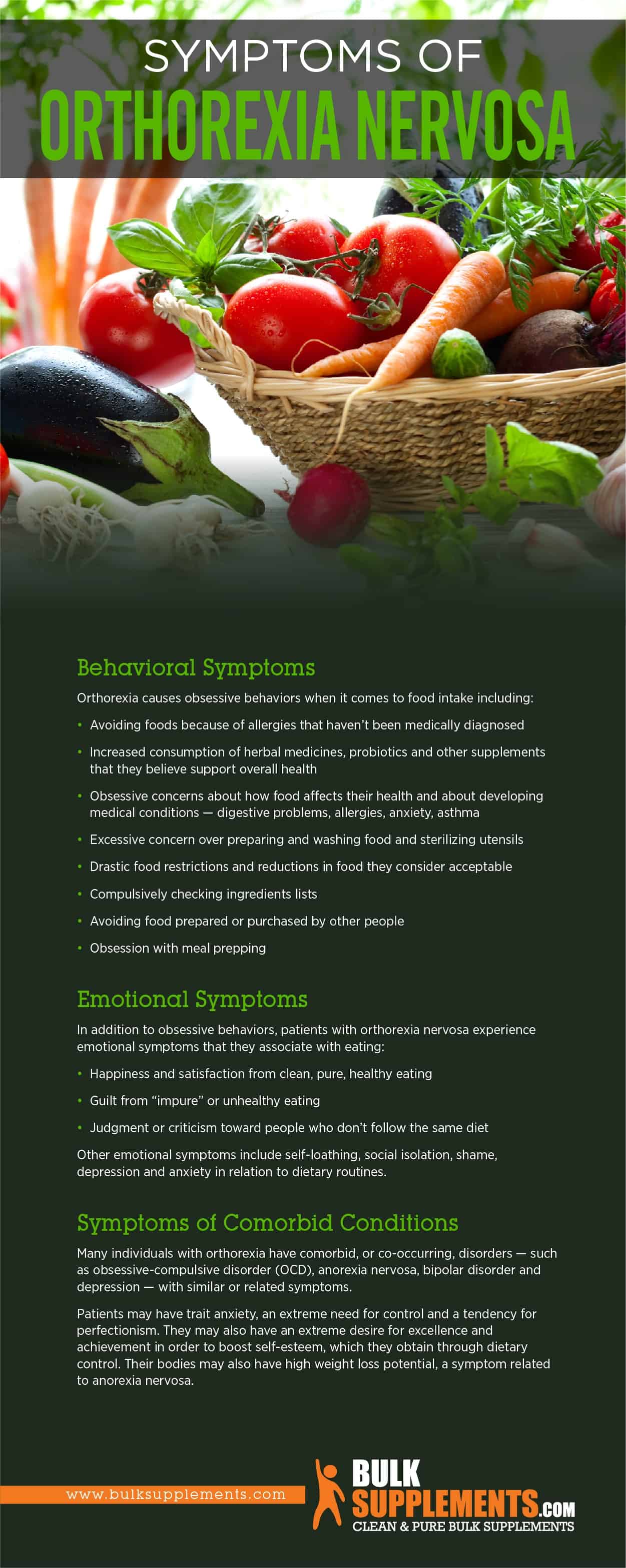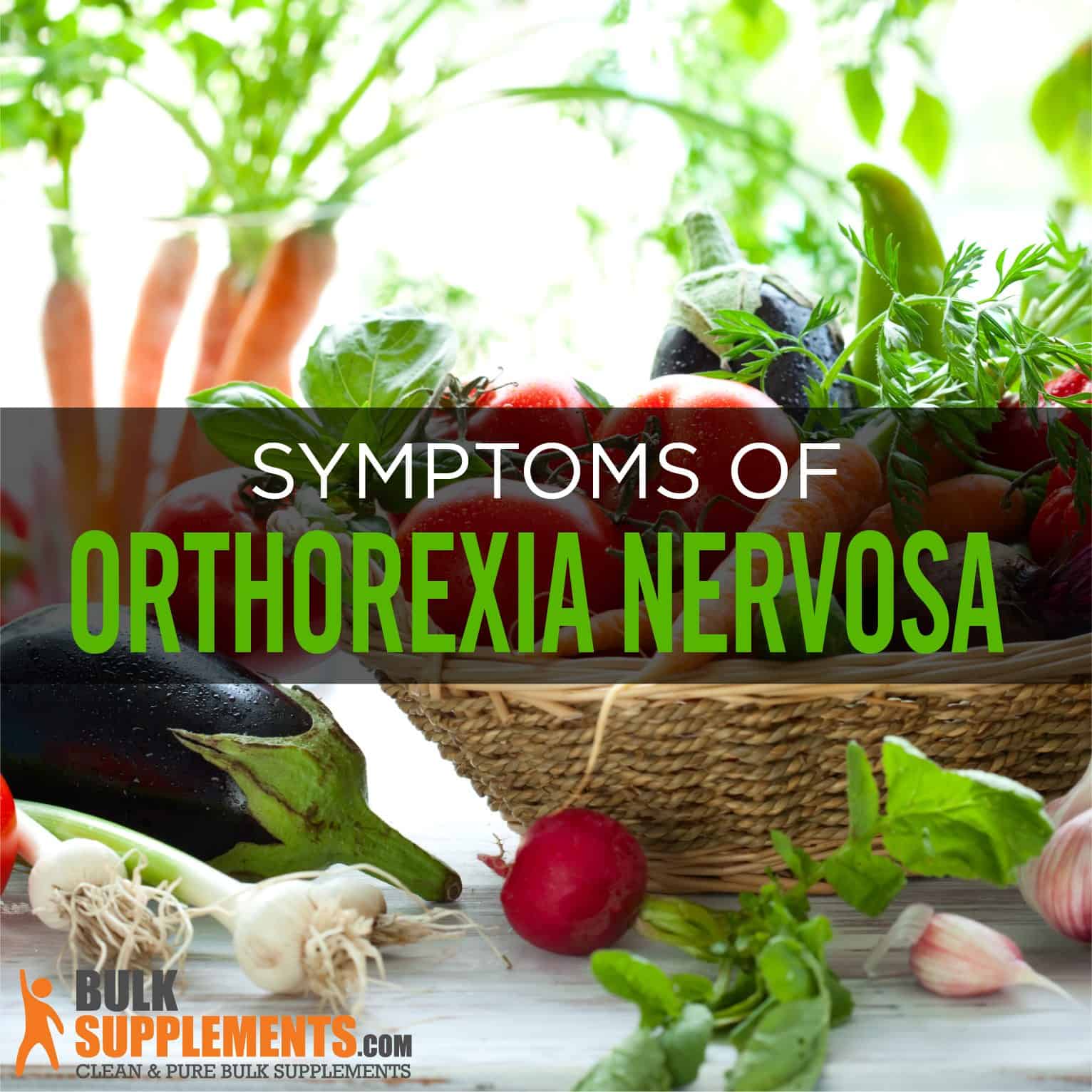Adopting healthy eating habits is common, and while it may improve your overall health and well-being, too much of something — even if it’s good — can cause adverse results. Orthorexia nervosa develops when someone has gone too far with healthy eating (x).
What is Orthorexia Nervosa?
Orthorexia nervosa is a disorder in which patients are obsessed with eating healthy food (x). However, it is not currently recognized as a mental condition, which has made some experts consider it as a type of obsessive-compulsive disorder (OCD), rather than an eating disorder (x).
However, no matter how it’s categorized, some eating disorder specialists say orthorexia nervosa is on the rise partly because of social media and the popular clean eating trend (x, x).
A lot of people try to eat healthy. But how do you know when it’s an issue? Healthy eating becomes disordered when food behaviors are obsessive and excessively restricting, decreasing the quality of your life and negatively affecting your emotional health and relationships.
Symptoms of Orthorexia Nervosa
People with orthorexia nervosa are obsessed with consuming pure, healthy foods. However, it differs from eating disorders like anorexia nervosa and bulimia nervosa because patients fixate on maintaining an ideal diet instead of an ideal weight.
To obtain the perfect diet, they may cut out entire food groups that that they consider unhealthy or impure. Orthorexia patients often eliminate all dairy, meat and animal products; all carbs, sugars and fats; all artificial flavors, preservatives or colors; and all genetically modified foods or pesticides (x).
Behavioral Symptoms
Orthorexia causes obsessive behaviors when it comes to food intake including (x, x):
- Avoiding foods because of allergies that haven’t been medically diagnosed
- Increased consumption of herbal medicines, probiotics and other supplements that they believe support overall health
- Obsessive concerns about how food affects their health and about developing medical conditions — digestive problems, allergies, anxiety, asthma
- Excessive concern over preparing and washing food and sterilizing utensils
- Drastic food restrictions and reductions in food they consider acceptable
- Compulsively checking ingredients lists
- Avoiding food prepared or purchased by other people
- Obsession with meal prepping
Emotional Symptoms
In addition to obsessive behaviors, patients with orthorexia nervosa experience emotional symptoms that they associate with eating (x, x):
- Happiness and satisfaction from clean, pure, healthy eating
- Guilt from “impure” or unhealthy eating
- Judgment or criticism toward people who don’t follow the same diet
Other emotional symptoms include self-loathing, social isolation, shame, depression and anxiety in relation to dietary routines.
Symptoms of Comorbid Conditions
Many individuals with orthorexia have comorbid, or co-occurring, disorders — such as obsessive-compulsive disorder (OCD), anorexia nervosa, bipolar disorder and depression — with similar or related symptoms (x, x).
Patients may have trait anxiety, an extreme need for control and a tendency for perfectionism. They may also have an extreme desire for excellence and achievement in order to boost self-esteem, which they obtain through dietary control. Their bodies may also have high weight loss potential, a symptom related to anorexia nervosa.

Risk Factors for Orthorexia Nervosa
Anyone can have an interest in healthy eating, but some people are more susceptible to developing orthorexia than others if they already have certain conditions or habits that increase the risk (x, x).
- Dieting
- Poor body image
- Drive for thinness
- History of eating disorders
- Obsessive-compulsive disorder, extremism, perfectionism
- Childhood illnesses with food or digestive issues
- Fear of disease
- Parents who emphasize the importance of food
- Playing sports or activities that cause pressure to maintain a certain body type or weight (x)
Treatment for Orthorexia Nervosa
Orthorexia can be treated, usually with medication or cognitive and dialectical behavioral therapy, both of which are models of psychotherapy (x).
Medication
Doctors can prescribe medication to treat orthorexia nervosa, usually antidepressants and anti-anxiety medications.
Cognitive Behavioral Therapy (CBT)
CBT can help treat OCD, which is often a comorbid symptom of orthorexia nervosa. CBT focuses on teaching patients to rework their behavior and the way they respond to certain situations, in order to reduce fear and anxiety and compulsive or obsessive thoughts.
Dialectical Behavioral Therapy (DBT)
DBT is a type of cognitive behavioral therapy that also combines with meditation therapy, focusing on problem solving and acceptance strategies (x).
Supplements for Orthorexia Nervosa
Though supplements cannot treat the condition on their own, they can promote mental and overall health as patients seek other forms of treatment.
Acetyl L-Carnitine Powder
Acetyl-L-carnitine is an antioxidant that promotes overall mental health. Take it in doses of 600 mg one to three times daily, depending on the desired effect.
Ascorbic Acid Powder
Also known as vitamin C, ascorbic acid is a powerful antioxidant that helps fight bacterial infections, detoxify reactions and form collagen. The human body cannot produce ascorbic acid naturally. Instead they must consume it in their diets from fruits and vegetables (x). The recommended dosage is 1,000 mg daily.
Branched Chain Amino Acids (BCAA) Powder
BCAAs are basic amino acids — valine, isoleucine and leucine. They can help decrease fatigue and increase endurance, according to a 2013 study (x). Another study shows that BCAA supplementation also helps enhance lean muscle mass and reduce body fat (x). The recommended dose is 1,500 mg three times daily, half an hour before or after a workout and with a meal to prevent nausea.
The Bottom Line
Orthorexia nervosa is a condition in which an individual obsesses over healthy food and increasingly restricts their diet until it damages their health.
Patients avoid food groups such as carbs, sugar, meat, dairy and animal products. Other symptoms include obsessively checking nutritional ingredients and spending hours mulling over future meals. Emotional symptoms also include pride from eating healthy food and guilt from eating unhealthy or “impure” food. There are several risk factors for orthorexia, including social trends, family habits or past food-related or digestive illnesses. Treatment options include cognitive behavioral therapy, dialectical behavior therapy and medication.


